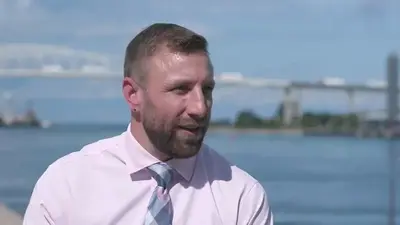Politics
'This Week' Transcript 10-29-23: White House National Security Adviser Jake Sullivan and Gen. Abe Abrams (Ret.)
A rush transcript of "This Week with George Stephanopoulos" airing on Sunday, October 29, 2023 on ABC News is below. This copy may not be in its final form, may be updated and may contain minor transcription errors. For previous show transcripts, visit the "This Week" transcript archive.
MARTHA RADDATZ, ABC "THIS WEEK" CO-ANCHOR: Joining us now is President Biden's national security adviser, Jake Sullivan.
Good morning to you, Jake.
Let's start with this movement into Gaza, has clearly reached a new stage with ground troops going in there. What do we know about the plan and how do you see this playing out?
JAKE SULLIVAN, WHITE HOUSE NATIONAL SECURITY ADVISER: Well, Martha, I'll let the Israeli Defense Forces speak to their plan. And war, of course, is highly unpredictable. So, it's difficult to predict how it will play out.
But I will say this. Israel was attacked in a brutal, vicious terrorist attack. They are taking steps to go after the terrorists who struck them. They have been doing so from the air. They're now doing so on the ground. And Hamas, this brutal terrorist organization that conducted the attack, is hiding behind the civilian population, which puts an added burden on Israel to differentiate between the terrorists and innocent civilians, but it doesn't lessen their responsibility under international humanitarian law and the laws of war to do all in their power to protect the civilian population. And that's equally true moving in on the ground as it is taking strikes from the air.
So, we will continue to talk to our Israeli counterparts. We'll continue to ask hard questions about how they are thinking this through, how they are proceeding. But, ultimately, these are their decisions. This is their action, and they’re best postured to be able to answer questions about how it's proceeding.
RADDATZ: And yet the U.S. provides weapons to Israel. And there are regulations and rules about the use of those weapons. How concerned are you about that? And you talk about human shields. Obviously, Hamas using human shields, and that's a violation of international law. But this is what international law says about those who are used as human shields. And when you think about Israelis possibly targeting them, international law of war says they are still entitled to full protections under humanitarian law and any harm must be weighed against a military objective.
Are you satisfied so far with Israel's adherence to that law?
SULLIVAN: Let me be absolutely clear about the position of the United States, Martha. And President Biden has said this. Secretary Blinken and Secretary Austin have said it and I've said it. Every innocent human life is sacred. And every step must be taken to protect human life. Whether that be Palestinian or Israeli or anyone else.
And there have been deaths of thousands of Palestinian civilians in this conflict, and that is an absolute tragedy. Those people did not deserve to die. Those people deserved to live lives of peace and sanctity and dignity.
At the same time, it is absolutely true that Hamas is doing everything in its power to put those people in harm's way, to use them as human shields, to hide rocket infrastructure and other forms of terrorist infrastructure among civilian areas. And, yes, there is a burden, as I said before, and as the president has said, on Israel to take the necessary steps to distinguish between Hamas, who does not represent the Palestinian people, and innocent Palestinian civilians.
But it doesn't lessen their responsibility under international humanitarian law. And, yes, it is also true that what we are providing to Israel is subject to the laws of war, and to the requirements that steps be taken to protect innocent life. Those are requirements we impose any time we transfer weapons to another country.
RADDATZ: Israelis say their objective is to eliminate Hamas and have the return of the hostages.
How do they do those two objectives?
SULLIVAN: Well, first, let me speak to the hostages because there are ongoing efforts which I can't get into detail on television, including regional partners, including the Israelis, and we are engaged as well to try to get all of those hostages out -- the American hostages and all the other hostages who are being held criminally and cruelly by Hamas.
We are continuing to see if there are ways to make that happen. We are prepared to support humanitarian pauses so that hostages can get out safely, and we will keep working at that every day because the president has no higher priority than the safe return of American citizens, and wants to support the return of citizens of other countries and Israelis as well.
Now, how exactly that happens? Again, I cannot predict that. All I can tell you is every effort is being undertaken right now to do that, and then from the military perspective, what Israel is trying to do is to ensure that Hamas cannot again present the kind of strategic systemic threat that it has been posing to the citizens of Israel. It is taking its military action to do that, and again, as I said before, they're going to be best postured to talk through how the objectives they have set are going to be met by the means they have set.
RADDATZ: Israel suffered the most horrendous assault imaginable by Hamas. I saw that up close, but I have also been in that region. I know there are many people there who simply don't believe it, and they look at what's happening in Gaza now.
Is Israel losing the information battle internationally?
SULLIVAN: Well, this is an issue, a longstanding issue. The situation between the Israelis and the Palestinians that has evoked strong emotions around the world, strong emotions in the region for a long time, and it's understandable because a lot of innocent people have been harmed in this. Innocent Israelis have died in the most horrific day of violence against Jews since the Holocaust. Innocent Palestinians have died in the midst of a conflict where Israel is trying to go after the terrorist masterminds and the terrorist perpetrators who conducted those gruesome massacres.
And so it is understandable that people in neighboring countries and people in the farthest corners of the world, they're looking at this as a deep, heartbreaking tragedy, because it is a deep, heartbreaking tragedy.
But the United States continues to stand behind a set of very core principles. Israel has a right, indeed a duty to defend itself against terrorists. Israel also has a responsibility to distinguish between terrorists and ordinary civilians, and the United States has a responsibility to do everything we can to make sure that life-saving humanitarian assistance gets to those people who have been affected by this conflict, and we are working at that every day.
RADDATZ: And, Jake, I want to end with this. The U.S. launched retaliatory strikes this week in Syria against Iranian proxies. There was an attack the next day on American troops. There have been about 20 so far.
Is Iran really getting the message? And if they don't, what happens?
SULLIVAN: Well, the president has been very straight forward on this. If American troops are attacked by Iran and its proxies, we will respond. We did respond. If attacks continue, we will respond.
And I think the Iranians understand our message, and we, of course, are taking every measure necessary to protect our forces, to increase our vigilance, and to work with other countries in the region to try to keep this coNFLict that is currently in Israel and Gaza from spinning out into a regional coNFLict. But the risk is real and therefore, vigilance is high, and the steps we are taking to deter that and prevent that are serious, systematic, and ongoing.
RADDATZ: Thanks so much for joining us this morning. We appreciate it.
SULLIVAN: Thank you.
MARTHA RADDATZ, ABC “THIS WEEK” CO-ANCHOR: Joining us now is retired Army General Robert Abe Abrams. He’s commanded troops around the world in his decades-long career, including Afghanistan and Iraq -- in both places seeing sustained, direct combat. That was especially true in Iraq where I first met him in Sadr City in 2004, a densely populated urban environment where hundreds of U.S. soldiers lost their lives.
So, General Abrams, you know a lot about this kind of warfare from your own experience. So, let’s start with what I asked Jake Sullivan. The stated Israeli objective is to eliminate Hamas, protect civilians and release the hostages. Can that happen?
GEN. ROBERT ABRAMS (RET.), FORMER U.S. FORCES KOREA COMMANDER & ABC NEWS CONTRIBUTOR: Martha, this is going to be a very difficult task for the Israeli Defense Forces, that the defense that Hamas will put up in that very de -- very dense urban terrain, unlike anything that we’ve seen in recent years, is going to require some very fierce fighting, and simultaneously trying to ensure that the Israelis do not target unwittingly the locations on the hostages, this is going to prove to be a very difficult task and we’ll just have to see how their plan plays out here over the coming days.
RADDATZ: Is this an impossible mission?
ABRAMS: I think it’s going to be what I would consider nearly impossible, to destroy Hamas, to eliminate their capability to do harm to Israel and the Israeli people, while simultaneously protecting what some people have estimated as to be a million Palestinians who are in harm’s way and they can’t get out of harm’s way.
And having lived this and seeing this myself at a very dense urban environment as you’ve mentioned, it requires extraordinary discipline, precision and you -- in some cases, you have to not fight to ensure that you have prevented injury to noncombatants. It’s a very difficult task.
RADDATZ: From what you have seen, are the laws of war being followed?
ABRAMS: I think every effort is being made to follow the laws of armed coNFLict. But each and every time you are going to fire a round, drop a bomb, shoot a rocket, you have to make a Military determination with regards to the Military necessity behind dropping that bomb and the proportionality associated with what comes from it. And each and every one of those requires that sort of very deliberate decision-making to ensure that everyone remains alive with the laws of armed coNFLict.
But the images that we are all seeing, Martha, they’re horrific. I can’t -- it’s hard to put words to it, and we can only hope that the Military necessity had -- that bar for Military necessity, that it’s been met to -- for us to accept what we’re seeing play out on TV.
RADDATZ: The losses in Gaza have been immense, of course. They were immense in Israel. But going forward, they can be even higher, not only the side in Gaza, but for Israeli soldiers as well.
ABRAMS: Yeah. I mean, this is going to be, you know, intense block by block fighting. It’s going to come from all directions. There’s a lot of high-rise buildings, so it’s three dimensional.
You hadn’t mentioned it yet, but there’s a very large subterranean component of this very difficult urban fight.
RADDATZ: The tunnel?
ABRAMS: So, it’s going to be slow, methodical. Yeah, the tunnels are going to be -- it’s going to, you know, be very difficult. And it’s going to be really, you know, slow-going.
We heard the prime minister recently say this is going to take a long time .And he’s right. It’s going to take a longtime.
RADDATZ: And when you say a long time, I think of Iraq. I think of Afghanistan. After 20 years, we lost that war. Iraq, we’re still there.
When you think a long time and you look at Gaza and you look at that urban area, are we talking months, years? And how does it end?
ABRAMS: Well, we’re certainly talking months, right? So, it’s not an exact comparison. But the battle for Mosul was about six months in duration. Now, it’s -- they’re not exactly the same. But it gives people sort of an idea.
But fundamentally, at the end of this, Martha, that we still have to answer the question what about -- what is the future? What -- you know, Hamas was created as a result of a lack of a separate Palestinian state. A two-state solution, as many people have talked about, that has to be somewhere when you asked, how does this end? That has to be part of the equation.
RADDATZ: And what about escalation? You saw the strikes in Syria, the retaliatory strikes. You see the spreading. Should the U.S. be doing more?
ABRAMS: I think the U.S. is taking all the appropriate actions to defend our troops that are forward deployed there in the region. And I have great confidence that they’ve got a fairly likely target list and they’re capable of taking all actions necessary to defend themselves. We can only hope that Iran and its proxies don’t take this to a much higher level and continue to escalate that sort of portion of this protection of our troops, because as the national security adviser just said, the Military, the U.S. Military will take all actions necessary to defend their troops.
RADDATZ: Okay, thanks so much. It’s good to see you. General Abrams, again, thanks for coming in.
-

 Politics11m ago
Politics11m agoSome states’ populations are very much like the US overall – including 5 key states in the 2024 presidential election
-

 Politics6h ago
Politics6h agoModi’s anti-Muslim rhetoric taps into Hindu replacement fears that trace back to colonial India
-

 Politics6h ago
Politics6h agoA silent Trump with eyes closed and a convicted liar on the stand − 2 experienced observers of Trump’s criminal trial discuss what stands out
-

 Politics12h ago
Politics12h agoWhite House Blocks Release of Biden’s Special Counsel Interview, Says GOP Is Being Political
-

 Politics12h ago
Politics12h agoSpring Visitors Weekend: West Place Animal Sanctuary, Tiverton
-

 Politics1d ago
Politics1d agoWhen Are the 2024 Presidential Debates?
-

 Politics1d ago
Politics1d agoBaltimore Mayor Brandon Scott Wins Second Term, Campaign Plays 'Not Like Us' Before Victory Speech
-

 Politics1d ago
Politics1d agoDonald Trump Could Still Scuttle the Debates



























